Israel, US Discuss Security Concerns, Military Option Against Iran

Israeli Defense Minister Benjamin Gantz met Friday with US National Security Advisor Jake Sullivan in Washington to consult on security issues of mutual concern.

Israeli Defense Minister Benjamin Gantz met Friday with US National Security Advisor Jake Sullivan in Washington to consult on security issues of mutual concern.
Discussing the draft of the agreement to revive Iran’s 2015 nuclear deal, Gantz reiterated Israel’s opposition to the deal, and pointed out specific components that the US must insist on in order for Iran not to build a nuclear weapon.
Stressing the need to strengthen military capabilities to undermine the Islamic Republic's nuclear progress and its regional aggression aside from the deal, Gantz told Sullivan the United States needs to ensure that it retains a viable military option against Iran’s nuclear facilities even if a new deal is reached with the Islamic Republic.
Axios quoted an unnamed senior Israeli defense official as saying that “A nuclear deal is not a peace treaty. A military threat has a lot of weight that can help create a deterrence even in a reality in which there is a deal.” Gantz received "positive hints" about a possible military option when he pressed Sullivan on the issue.
"We feel there is a trajectory for deepening and strengthening the capabilities against Iran and the Americans understand deeply that it will give the Iranians an incentive to be more pragmatic about the nuclear deal and will strengthen their position," the official added.
Sullivan emphasized President Joe Biden’s unwavering commitment to Israel’s security, and the two exchanged views on ways to deepen the US-Israel security partnership, including via regional cooperation and coordination.
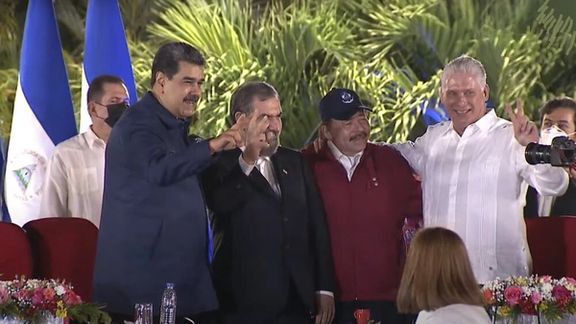
“Iran’s play in America’s backyard” is the headline by the official government news website IRNA heralding new hopes of expanding influence in Latin America.
The article tried to give credit to hardliner President Ebrahim Raisi for making more inroads in Central and South America, particularly drawing attention to the election of a leftist president in Columbia.
IRNA publishes several articles daily to praise the accomplishments of the president who is under fire even by some hardliners for having failed to deliver any of his promises when he got elected last year.
The article about Latin America published on August 25 is no exception, presenting as a victory a trip by one of Raisi’s aides to Columbia in early August to take part in the inauguration of Gustavo Petro, a former anti-American leftist guerrilla fighter. IRNA said that Petro had condemned the targeted killing of Qasem Soleimani in January 2020 on the orders of former US President Donald Trump, saying, “America always empowers the worst in the Middle East.”
The article mainly speaks about Latin America’s economic and diplomatic potential and makes no mention of Iran’s long-running overt and covert operations to build influence and networks in the region, together with its proxy, the Lebanese Hezbollah.
“Experts believe areas of cooperation with Latin American countries can include energy, particularly oil, food production industries, chemical industries, infrastructure, dam construction, electricity generation and hydroelectric power…,” IRNA said, adding a few other options.
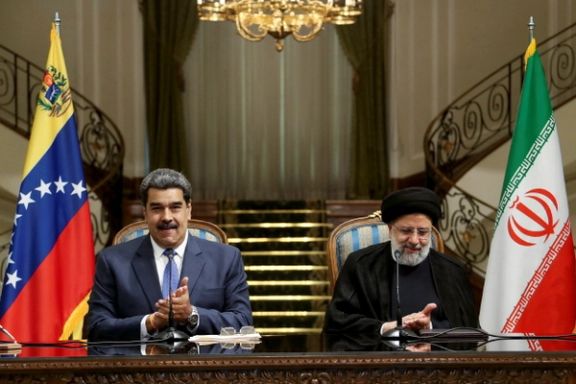
Iran already closely cooperates with Venezuela in fossil fuels and security matters.
However, since 2005 when Iran’s attempts to expand its foothold in Latin America gained more momentum, Tehran has made plenty of economic promises to the region’s countries, but few have materialized because the period since has been marked by crippling international and US sanctions on Tehran.
With a possible nuclear deal on the horizon, these sanctions will be lifted, and Iran will get hold of tens of billions of dollars it can spend in Latin America. The IRNA article seems to be oriented toward making investments in countries friendly with the Islamic Republic.
But some countries are a bit careful about Iranian activities. In early June, Argentina grounded a Boeing 747 that Iran provided to Venezuela to launch an air cargo company. The plane was carrying at least five Iranians all with IRGC (Revolutionary Guard) ties.
Gerardo Milman, an Argentine lawmaker, told Iran International on June 23 that Iranians aboard the Venezuelan plane planned “attacks on human targets.” The aircraft itself had belonged to an Iranian airline with ties to the IRGC and had been sanctioned by the United States.
Secret Iranian and Hezbollah networks are involved in illicit activities, allegedly including the drug trade for generating funds.
Iran also converts locals to Shiite Islam and sends some to its seminaries in the religious city of Qom to be trained and indoctrinated.
US Senators Bob Menendez and Marco Rubio were concerned over Iranian activities as far back as in 2012 and held hearings to assess the threat of Tehran launching anti-US operations from its backyard.
Two experts in 2020 offered a grim prospect on Iran’s influence in the region. “Iran has penetrated the governmental structure of many Latin American nations, especially the nations of the already left-leaning Bolivarian Alliance (Cuba, Venezuela, Bolivia, Antigua and Barbuda, Dominica, Nicaragua, Saint Lucia, Saint Vincent and Grenadines, Saint Kitts, and Nevis), and this is not only unconventional but also very dangerous.”
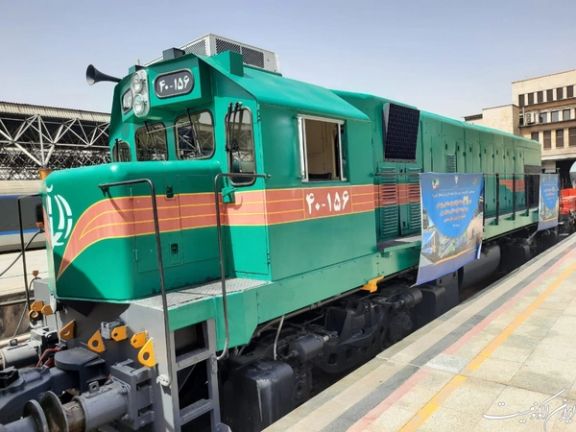
Iran’s Railway Company says about half of Iran's locomotives are grounded, noting that out of 950 locomotives, only about 500 are active.
Confirming the figures, the country’s Roads and Urban Development Minister Rostam Ghasemi says Iran faces a severe shortage of freight rail fleet, adding that the sector needs at least a thousand locomotives.
According to an article by the Shargh Daily on Thursday, Ghasemi said that the lack of functioning locomotives has led to long delays in delivering materials for steel, iron smelting, copper and mines industries.
He added that delays of more than 20 days in transporting cargos have reduced the production capacity of some factories and disrupted heavy industries.
The article says the country needs to transfer about 300 million tons of cargo only in the steel sector, but the total volume of cargo transferred in Iran's railway system barely reaches 40 million tons.
Criticizing Iran’s old and ramshackle locomotive fleet, the article said the minimum speed of freight trains in the world is about 80 kilometers per hour but in Iran it is about 20-25 km/h.
In addition to the rail system, an Iranian lawmaker said earlier this month that due to sanctions on the country the quantity and quality in Iran's aviation sector is also decreasing day by day.
Criticizing Roads and Urban Development Ministry, Alireza Pakfetrat, the representative of Shiraz in the parliament, said the ministry is spending most of its time and budget on housing projects and forgets that the aviation industry is also part of its responsibilities.
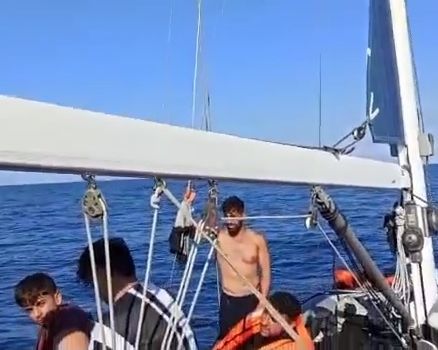
A boat with about 85 Iranian and Afghan passengers, including 30 women and children, has been stranded in the Mediterranean waters, Iran International has learned.
According to the pictures, videos and audio files obtained by Iran International, about 70 passengers of the boat, which set off its journey on Wednesday, August 24, are Iranians.
The boat has been stranded in west of Greece since Thursday due to an engine failure and one of the asylum seekers in the videos says that they have contacted the Greek and Italian coast guards, but no one came to their aid. The refugees on the boat said that they have run out of food.
One of the relatives of the asylum seekers, who lives in Denmark, told Iran International that the boat left from Turkey.
In the videos, some refugees are seen who are trying to swim to reach the nearest shores.
Last December, Hengaw Organization for Human Rights reported that at least eight Iranian Kurdish refugees died as they aimed to escape from Iran to Europe in the past several months.
Iranians – who have a long history of emigration, particularly since the 1979 revolution -- constitute a large number of migrants who begin trying to reach the UK by undertaking dangerous journeys across the English Channel, as well as to Europe through the Mediterranean Sea.
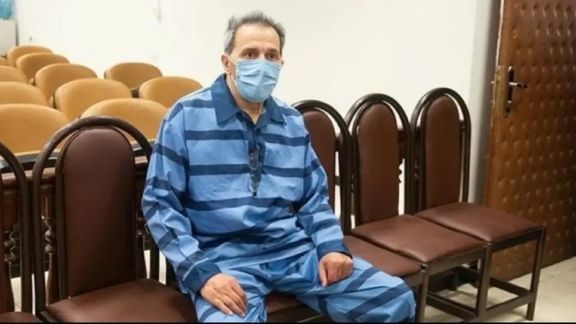
The German Foreign Ministry has confirmed that the Iranian government has detained a German citizen about 40 days ago.
In response to an inquiry by Radio Farda, the ministry said the Islamic Republic has arrested the 66-year-old tourist more than a month ago over accusations of "taking pictures of prohibited areas".
According to information obtained by Radio Farda, he had travelled to different cities across Iran, including Tehran and Tabriz, by a motorcycle.
The German national was arrested more than 40 days ago, and spent about half of it in solitary confinement. He is now imprisoned in the general ward of Aran-o-Bidgol prison near Kashan in the central Esfahan (Isfahan) prison.
The German authorities were informed of his arrest after his daily communication with his family was cut off on social media networks, and with the follow-up of the family through the German embassy, it was found that he was arrested in Aran-o-Bidgol, a tourist destination at the edge of Iran’s central desert.
The German Foreign Ministry did not mention the reason for his trip to Iran, or the exact time of his arrest, but it confirmed that Germany has consular access to this imprisoned citizen.
The spokesman of the German Foreign Ministry emphasized that he could not disclose more details in this regard, and Iran's judicial and security authorities have not yet announced the arrest of the German citizen.
At least four German citizens are jailed in Iran, including Nahid Taghavi and Jamshid Sharmahd. Taghavi, 67, a German-Iranian rights activist is imprisoned since October 2020 and is sentenced to 10 years, while, Sharmahd, 66, is kept in isolation at a secret location since he was snatched by Iranian agents while travelling to India in August 2020. Sharmahd is accused of involvement in a 2008 mosque bombing in Iran that killed 14 people.
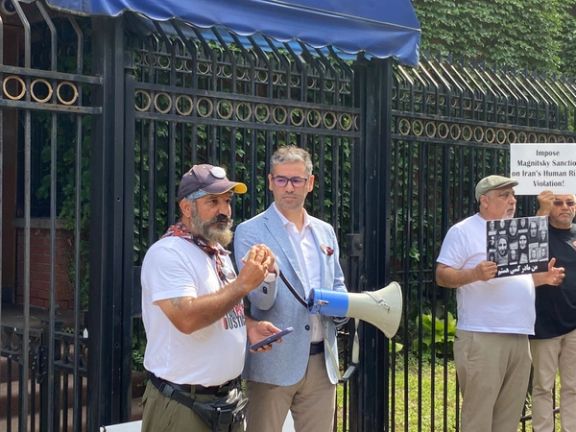
The father of one of the victims aboard Ukrainian Flight 752, which was shot down by Iran’s missiles in 2020, has arrived in Ottawa after marching for over two weeks to meet Canada’s premier.
Mehrzad Zarei, father of 17-year-old Arad who died in the shootdown, who had started his symbolic 400-kilometer march from his son's grave in Richmond Hill, Ontario, arrived in Ottawa Thursday hoping to personally deliver his protest letter to Prime Minister Justin Trudeau.
With Trudeau out of town, Zarei held a meeting with parliamentary secretary to the prime minister Greg Fergus instead. Family members of other victims from Flight 752 who held photos of their loved ones and remained outside the Prime Minister's Office.
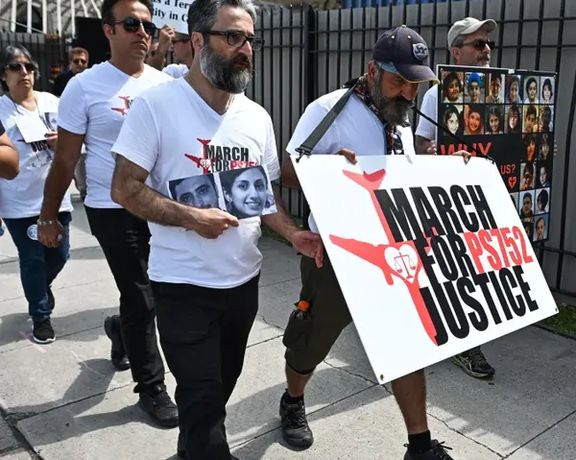
"Today's message, we say, enough is enough," Zarei told reporters before the meeting, and went on to read his letter addressed to Trudeau.
Criticizing a lack of justice for the victims of the incident, he demands that Canada designate Iran’s Revolutionary Guard as a terrorist organization, as was stipulated by a Canadian parliament's resolution in 2018. Other demands include Canadian sanctions on Iranian authorities and for the case to be pursued at the International Court of Justice, and The International Civil Aviation Organization (ICAO).
Having planned a sit-in in front of the parliament, the family members will return to Ottawa on October 4 to mark 1,000 days since the flight was shot down and to renew their calls for justice.
The airliner was shot down by two air-defense missiles fired by the IRGC on January 8, 2020, as it took off from Tehran’s Imam Khomeini International Airport. Only hours earlier, the IRGC had fired more than a dozen missiles at Iraqi bases hosting US and coalition troops in retaliation for the killing of the IRGC Qods Force Commander Ghasem Soleimani who was killed in Baghdad by a US drone strike just five days earlier.